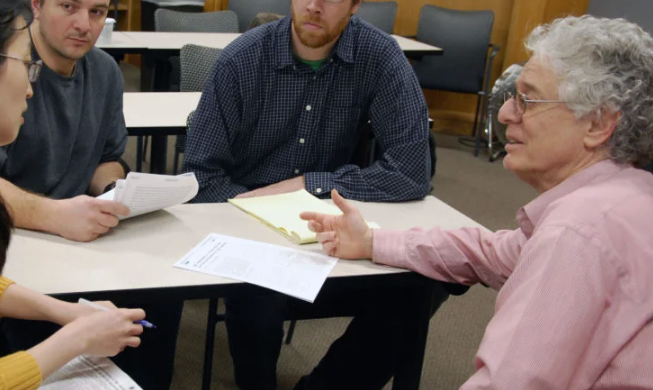The PCI Fellows program offers a competitive and paid internship opportunity within one of the most successful academic technology commercialization offices globally. The program is open to graduate students, postdoctoral fellows, and, in select cases, junior research staff at Penn and provides participants with an opportunity to work alongside licensing experts in diverse areas such as life sciences, physical sciences, and medical devices.
Program Components
- Apprenticeship: serving as a PCI Fellow allows you to play a vital role in technology commercialization, significantly supporting patenting and licensing decisions that are made by PCI leaderships. The hands-on involvement in transforming innovations into market-ready products is instrumental in driving technological advancements.
- Education: PCI Fellows participate in a comprehensive training workshop and receive personalized mentoring, which prepares them for their apprenticeship roles. This experience is designed to develop their skills as professionals in technology commercialization, effectively shaping their career paths in this dynamic field.
- Monthly Meetings: These meetings allow Fellows to network, address program questions, and discover various career opportunities in Technology Innovation. They also interact with former Fellows, who have progressed in their careers and provide insights and advice to newcomers.
Fellow Projects
PCI Fellows primarily engage in three types of projects:
- Invention Assessment: This involves a detailed analysis of the technical, commercial, and intellectual property aspects of invention disclosures submitted by Penn researchers.
- Marketing Assessment: Fellows create non-confidential summaries of Penn inventions to support PCI licensing officers in their outreach to potential partners.
- Special Projects: On occasion, Fellows may participate in market research and licensee outreach as additional responsibilities arise.
PCI TLO-Fellow Pilot Engagement Program
Fellows selected from among those who opt for a second year gain a unique opportunity to work closely with Licensing Officers. This collaboration focuses on more complex facets of technology commercialization, providing an immersive experience in advanced aspects of the field.
Required Commitment
PCI Fellows are expected to approach their roles with a professional business mindset, ensuring a commitment to quality and efficiency in all aspects of their involvement. Specifically, they are required to:
- Engage fully in the initial in-person training sessions.
- Commit to a one-year tenure, with the option to extend their participation.
- Dedicate up to 10 hours each week to assigned projects, mirroring a business-like work ethic.
- Attend monthly training meetings to enhance their professional development and network.
- Adhere to strict project deadlines, reflecting the rigor and discipline expected in a business setting.

Who can become a PCI Fellow
We seek engaged, scientifically-trained individuals from all Penn schools, particularly those with:
- UPENN affiliation.
- Strong scientific background.
- Excellent written communication skills.
- Notable academic performance.
- Keen interest in technology innovation.
Career Pathways for Program Graduates
PCI Fellows Program graduates typically progress to successful careers in diverse and dynamic fields, such as Technology Transfer, Intellectual Property Law, Consulting, R&D, Venture Capital, and Startups. The comprehensive training, hands-on experience, and network connections gained through participation in this program render our alumni highly desirable candidates in these competitive career paths. Their involvement in the PCI Fellows program not only signifies a commitment to innovation and technology commercialization but also equips them with a unique skill set that is greatly valued across these industries.
For more information, visit the FAQ page here.
Program Director
Dr. Tomás Isakowitz, a leader with extensive business and academic experience, directs the PCI Fellows program. He also oversees Penn I-Corps, a highly successful initiative funded by the National Science Foundation. This program is designed to support the development of robust business models, fostering company creation from Penn research. It is integral to translating scientific and technological innovations into market-ready ventures
Application Process
Step 1
Application Submission

Step 2
Review Timeline

Step 3
Interview Invitations

Step 4
Announcement of Acceptances

Step 5
Program Offers

Step 6
Confirmation and Vetting Process

Step 7
Training

Required Application Documents
The applications process requires five documents. Because the application form can only be submitted once, you need to combine these five documents into one PDF file BEFORE proceeding to the online application. The PDF file should be named as follows:
<Last Name>_<First Name>_PCI_Fellow_Application.pdf
Example: Smith_Jonathan_PCI_Fellow_Application.pdf
Within the PDF, each documents should start on a new page in the following order:
1. Cover Sheet
Edit the cover sheet format available here; add your name and date where shown; leave the rest of the page blank. The reviewers use it to write their comments.
2. Resume
Please provide a recent one-page resume (not a scientific CV, but a one page resume)
3. Technology Evaluation Write-up
Written communication skills are crucial for the kind of work you will be performing. You will be required to explain complex technologies in succinct ways using language that is not too technical. Think of it as writing an article for the New York Times’ science section. To appraise your ability to communicate in writing, you need to select a publication below and prepare a technology assessment using this Word template. You are not allowed to pick a publication from your own research team.
Publications for Technology Evaluation:
1. Ageitos L, Torres MDT, de la Fuente-Nunez C. Biologically Active Peptides from Venoms: Applications in Antibiotic Resistance, Cancer, and Beyond. Int J Mol Sci. 2022 Dec 6;23(23):15437. doi: 10.3390/ijms232315437. PMID: 36499761; PMCID: PMC9740984.
2. Driscoll N, Dong R, Vitale F. Emerging approaches for sensing and modulating neural activity enabled by nanocarbons and carbides. Curr Opin Biotechnol. 2021 Dec;72:76-85. doi: 10.1016/j.copbio.2021.10.007. Epub 2021 Oct 29. PMID: 34735988; PMCID: PMC8671243.
3. Alexander Robey, Hamed Hassani, George J. Pappas; Model-Based Robust Deep Learning: Generalizing to Natural, Out-of-Distribution Data. arXiv preprint arXiv:2005.10247, 2020
4. Jin, Lishuai, et al. “Ultrafast, Programmable, and Electronics‐Free Soft Robots Enabled by Snapping Metacaps.” Advanced Intelligent Systems(2023): 2300039.
5. Lanitis E, Poussin M, Hagemann IS, Coukos G, Sandaltzopoulos R, Scholler N, Powell DJ Jr. Redirected antitumor activity of primary human lymphocytes transduced with a fully human anti-mesothelin chimeric receptor. Mol Ther. 2012 Mar;20(3):633-43. doi: 10.1038/mt.2011.256. Epub 2011 Nov 29. PMID: 22127019; PMCID: PMC3293635.
4. Statement of Interest
Prepare four separate paragraphs, each running 70 words or less. Use the text of bullet points below for paragraph sub-titles.
- Why you are interested in the Fellows Program
- The areas of expertise you would bring as a PCI Fellow
- Your ability to express yourself clearly and succinctly in written English
- Your long-term career goals
5. Consent Forms
Depending on the program you are currently on you may need zero, one, or two consent forms. These have to be signed and included with your application.
Post-doctoral fellows:
Doctoral Students
Staff: Letter of consent from business administrator
Master students employed by UPENN (e.g., as a TA, or RA): Letter of consent from business administrator.
Other Students: No consent forms are necessary
Why do we ask for a consent form from your advisor?
PCI wants to ensure that your advisor supports your participation in the PCI Fellows program, and that your advisor does not perceive this as a conflict with your primary responsibility. We ask for this consent at the time of your application because we want to ensure that if you are accepted you will be able to participate. Moreover, a discussion with your advisor at an early stage will help you get a better understanding of how to better integrate the fellowship with your primary responsibility at Penn.
Why do we ask for a consent form from your business administrator?
We want to make sure that if you are accepted into the program, you can get paid. There might be administrative restrictions on your ability to engage in additional work at Penn. It is better to clarify this early, and not find yourself in a position where you have worked and cannot get paid.
Applications for the 2026 cohort will open in November 2025.
Application Deadline: November 30, 2025.